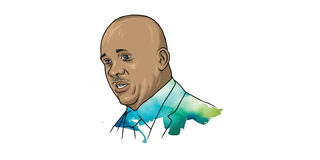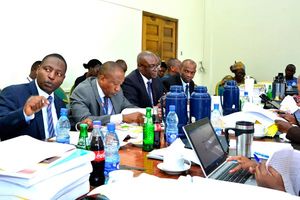
Julius Mukunda, CSBAG executive director
We have just come through a budgeting process for the Fiscal Year 2024/25 in which slightly over Shs72 trillion was appropriated. The chances that you saw Julius Mukunda give his two cents on the budget via mainstream media are, I guess, highly probable.
The budget was pushed north of Shs70 trillion after a corrigendum was debated in the House during after hours.
When the mainstream media sought Mr Mukunda’s thoughts on the corrigendum, he spoke candidly while ripping apart the country’s budget wonks for the fiscal indiscipline displayed. While at the Civil Society Budget Advocacy Group (CSBAG) office where Mr Mukunda works as the executive director, I commend him for a steady stream of commentary for the media.
“I should be available when people reach out” is his response when I commend him. And it turns out he is also available as can possibly be at CSBAG’s Ntinda-based office. The executive director’s open door policy ensures that CSBAG’s foot soldiers frequently walk in and out of Mr Mukunda’s office. Some have an update on recent economic trends, others are seeking guidance on upcoming meetings.
When the interview starts proper after exchanging pleasantries, CSBAG’s top dog has a bone to pick with the Uganda National Oil Company (Unoc).
The excitement around the first consignment of petroleum products Unoc has shipped in courtesy Vitol Bahrain has just started to peter out. Word of a $40m (about Shs148.3 billion) bond fee has just hit a crescendo.
Not good enough
Mr Mukunda believes that the poor business mentality and absence of the necessary smarts by government technocrats is to blame for Uganda’s travails.
“Unoc didn’t see this coming because our ability to execute projects in this country has been extremely very poor,” he tells me, adding that “they [government officials] concentrated so much on kicking out the middlemen in Kenya, but they paid less attention to the role that the middleman in Kenya was playing.”
Not about to let the subject fizzle out, he does manage to hazard a guess. Could the dicey economic relations between Kenya and Uganda have birthed the terrible outcome?
“Probably Kenya didn’t play as a good neighbour,” he says of the protectionist policies that have gained traction in recent times, adding, “We were sort of stabbed in the back because they knew very well what our motive was. They supported us from the beginning, but they did not tell us initially how this was going to fold out.”
Nonetheless, all is not lost as he believes that there is room to rework the deal and negotiate for better terms with Kenya.
“Let’s go and renegotiate. There is no way we should back out. Let’s get in. we should get in and also be as shrewd as the middlemen in Kenya so that we can get oil to this country,” he said.
Rushed and ill-crafted policies by government technocrats also affect other sectors like the banking sector where indigenous ones struggle to penetrate and or even die.
Grooming small banks
Numerous banks have been facing operational difficulties that have compelled them to transfer costs to debtors in the form of elevated interest rates.
Mr Mukunda believes this is because of a spike in their capital requirements on their backs. The central bank mandated commercial banks to increase their capital minimum capital from Shs25 billion to Shs150 billion by June 30, 2024.
A few commercial banks have already decided to have their licences downgraded, possibly because they anticipated that they would not be able to meet the minimum requirement by the deadline.
In other cases, potential mergers and acquisitions are being considered as a means of bridging any financial deficiencies.
Mr Mukunda believes the requirements such as the heavy capital requirements for banks plus other harshly imposed policies imperil small entities.
Some are even pushed over the precipice as was recently the case with Mercantile Credit Bank Ltd. Its licence was last month revoked by the Bank of Uganda and summarily ordered to wind-up.
For the CSBAG executive director, this brought back memories of Teefe Bank that closed in 1993; International Credit Bank Limited, which exited in 1998; Greenland Bank in 1999; National Bank of Commerce in 2012. The most recent cases are Global Trust Bank that wound-up in 2014 and the Crane Bank Limited closed shop and surrendered its assets to the present-day dfcu in 2016 are also a heartbeat away.
“If we don’t create opportunities for small banks to get into the market, then these banks are going to create problems for us. One day they [established banks] pull out and we may be plunged into a dire situation,” Mukunda says.
To him, the remedy lies in crafting policies to cater to organic growth.
“We need to ease competition. You cannot put the same regulations of a huge bank like Stanbic and you put the same regulations on Teffe Bank. That is out of the question. We need to provide an environment for small banks to grow,” he advises.
Light at the end of the tunnel
The optimistic in Mukunda soon surges forward as our interview enters the home straight. The CSBAG top honcho tells me that he is hopeful that Uganda can right its wrongs.
With better policies in place, the country can attract more investors to actualise opportunities that are hardly in short supply. President Museveni’s recent tough stance on corruption is also another source of optimism.
Despite this, Mr Mukunda wants the President to even go further in the fight against graft. He, for instance, advocates for what he termed as “non-conviction based prosecution” as one of the measures that will ultimately make corruption a “risky venture” to indulge in.
“We need non-conviction based prosecution. If we arrest you and believe that these are the properties that you have acquired illegally. We freeze them until the prosecution is over,” he tells me.
Before we can say our goodbyes, Mr Mukunda expresses his dissatisfaction with the President following his decision to create a new outfit to combat corruption within the Uganda Revenue Authority.
Mr Mukunda says the formation of the State House Revenue Intelligence and Strategic Operations Unit is “going to weaken URA [intelligence unit] and all these other anti-corruption agencies. We both cannot help but laugh at the grim prediction.






